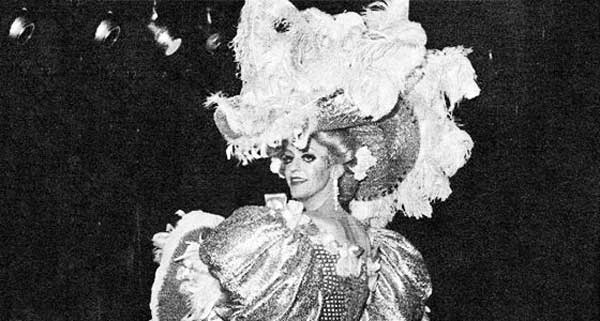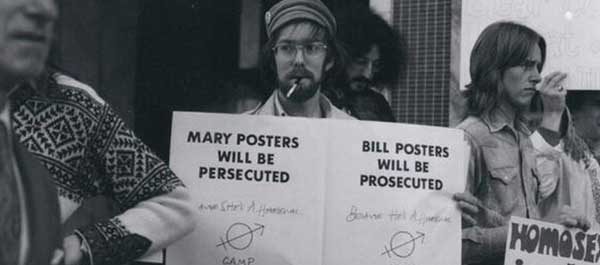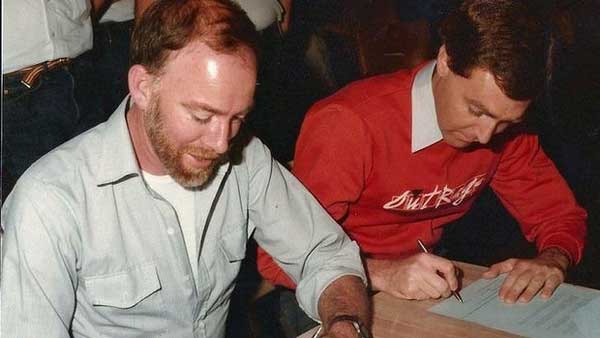It was the Romans who, believing that certain times of the year were inauspicious, took the auguries, gave serious consideration to their supposed message, and acted accordingly.
For Sydney, the last few months might well seem inauspicious, with the deaths of two very different Sydney gay icons, Alexander [Lex] Watson, who died on Tuesday 6 May, aged 71, and David [Beatrice] Williams, who died on Sunday 8 June, aged 79.
But the lives of these two very different persons – Beatrice the entertainer and Lex the activist – left the city vastly enriched.
Beatrice was born in London in 1935 and was evacuated during the war to Ballarat, Victoria. He went to Wesley College and then to Melbourne University in the early 1950s.
Leaving university before graduation, he bought a decorating business from Bee Taplin with money he had inherited from his father.
He later sold his share of the business and, after a short stay in London, joined Leslie Walford's decorating business in Sydney.
Beatrice took easily to the social life of Sydney's camp scene, including the elaborate house parties at the home of decorator Neville Marsh in Paddington.
Neville hosted fashion show parodies, with men in drag showcasing fashions of the day.
But neighbours' complaints forced David and his friends to move, and to find an alternative place to re-create their hilarious tableaux.
This was the Purple Onion, in Anzac Parade in suburban Kensington, an unlikely locale for what would have then been outrageous theatrical entertainments.
David had been introduced to the owner, Ken (Kandy) Johnson, who was also attempting to become the licensee of the Lord Roberts Hotel in East Sydney, and needed to sell the Onion.
It was in Kandy's production of Li'l Abner that David made his first stage appearance.
David and Kandy agreed on terms (including that Kandy would continue to produce the shows at the Onion) and the Onion’s business was bought by David.
When this arrangement came to an end, after Kandy moved to the Lord Roberts and produced his own shows there in the Volga Room, David devised his own cabaret-style shows at the Onion, becoming Beatrice.
His first was Hallelujah Beatrice starring the drag artiste Black Lesley.
The unexpected success of Hallelujah Beatrice sparked a string of shows which broke the mould of Sydney drag of the late 1960s.
Until then, it had largely been glamour reviews at Les Girls or The Jewel Box or The Annexe, all in Kings Cross, or Kandy's comedy shows, originally at Kandy’s Garden of Eden in Enmore Road Newtown.

This was at a time when male homosexual acts and emotions were still illegal, with severe jail sentences if convicted. Cross-dressing was also illegal, except for theatrical performances rather than for personal satisfaction.
But despite these restrictions, the number of drag shows in Sydney was growing, and the satirical OZ magazine suggested disparagingly that, in the “upsurge of camp venues around Sydney”, there was “little satire, wit, or anything else; the sole entertainment is in the fact that the performers are men in drag.”
It may, however, have been taking its debunking role too seriously, for the Onion was very different.
The prominent theatre critic Katherine Brisbane certainly saw the drag shows at the Onion in a different light to Oz, giving them critical acclaim.
Writing in Pol magazine, she said “The Purple Onion is one of my favourite theatrical haunts – a place where anything is possible and nothing is what it seems…. And just now it is exactly right.”
Brisbane further suggested that what the Purple Onion offered was “a piece of rare and authentic burlesque; shrewd, witty, obscene, and always up-to-date; and in no other atmosphere could it possibly work so well.”
The audiences increased and the shows gained wide appeal, both in the gay community and in Sydney’s ‘with-it’ crowd.
Some of the memorable shows included How to be Beatrice; Mostly Beatrice; A Little of What You Fancy; Totally Beatrice; Cinderella; The Sound of Mucus; A Streetcar named Beatrice; and Carmen – The Story of a Woman Destroyed.
While it was perhaps the 'entertainment' aspect that might draw heterosexuals to these venues, for those with homoerotic inclinations there was the added attraction that others like themselves would be there too, both as audience and performers.
One patron of the Onion remembers it thus: “On Thursday, Friday and Saturday nights it was mainly for a straight audience. But Sunday nights it was gay night, and the atmosphere was dramatically different. On straight nights, men were not permitted to dance with men, nor women with women; but ‘anything goes’ was the catchcry on Sunday nights”.
Visiting celebrities, such as Dusty Springfield or Shirley Bassey or Robert Helpmann, were among those who could be found there on Sunday nights.
But the Purple Onion’s glory days were soon to be over; its death knell was a major rent increase.
David left Australia with a close friend, Deborah Williams [no relative], and performed The Sound of Mucus in London.
He moved to Paris and worked as a solo performer in various clubs and then as the first transvestite performer at the Paris Opera, as "Venus" in theatrical entrepreneur Kenneth Macmillan's production of Four Seasons.
David established a career for himself overseas, returning to Australia occasionally, eventually settling in Sydney, where he did volunteer work, including with the Community Service Network and for the Positive Speakers Bureau.
Sydney’s cultural life owes him much.
******
FOR Lex, it was a very different story. For many of his generation and beyond, Lex was the face of gay activism in Sydney.
Alexander ‘Lex’ Watson was born in Perth on 29 January 1943 and educated there. He came to Sydney in the late 1960s to complete a degree in Politics at Sydney University, eventually joining the staff, where he remained for the rest of his academic life, teaching Australian politics to hundreds of students, many of whom became academics and political activists themselves.
It was in Sydney that he began to explore the camp scene, and where he also became a lifelong supporter of the Council of Civil Liberties.
The homosexual law reforms in Britain in 1967 sparked his interest and he became involved with reform here in Australia.

It was in The Australian on 19 September 1970 that the formation of the Campaign Against Moral Persecution (CAMP), the first openly homosexual group in Australia, was announced, and Lex became a foundation member.
In early 1972, along with Sue Wills, Lex became a Co-President of CAMP. They both succeeded in placing the group on a more solid organisational footing after a ‘rather anarchic’ first year.
It was Lex who organised the first-ever gay demonstration in Australia… outside Liberal Party Headquarters in Ash Street, Sydney, in October 1971.
Lex, as an academic, had contacts in the Liberal Party and he got to hear of the challenge that arch-conservative Jim Cameron was to bring against the Federal pre-selection of Tom Hughes, after Hughes, as Federal Attorney-General, had raised the issue of homosexual law reform.
It was a noisy, fun-filled demonstration. They had helium balloons – then a novelty – and some bemused delegates, who later left the meeting after asking to take them home to the kids, despite the slogans.
Hughes won the pre-selection ballot.
One of the major achievements of CAMP under Lex and Sue was their endeavours to highlight the dangers of aversion therapy and psycho-surgery, as then practised against women and homosexuals.
That homosexual people then began to cease consulting practitioners for a ‘cure’ for their sexual orientation was a triumph for their work in CAMP.
By 1974, CAMP was winding down as a political organization, and Lex and Sue resigned from it in October 1974.
Lex continued his activism and advocacy through newspaper articles in the gay press.
In 1976 he memorably and courageously appeared on the ABC Monday Conference program in Mt. Isa.
Some of the audience were openly hostile, one member even pouring a bottle of sewage over Lex’s head.
Lex maintained his composure throughout, and won the audience over.
With the assistance of fellow academic and activist Craig Johnston, in 1980 Lex approached Barry Unsworth of the NSW Trades & Labour Council, after the Sydney University Staff Association [SAUT] had passed an anti-discrimination motion in relation to gays and lesbians.
Unsworth was receptive, and had a similar motion passed in the Council.
The move was the beginning of the Gay Rights Lobby (GRL) and a new concerted push for homosexual law reform in NSW.
This saw several attempts at reform over the next four years, as well as support for a Bill that incorporated homosexuality into the terms of the existing Anti-Discrimination Act 1977.
After the police raid on the sex-on-premises venue Club 80 in 1983, it was Lex who suggested that community activists all sign Statutory Declarations admitting to having committed buggery and to present them to the Vice Squad, seeking arrest.

Lex was one of the first to present, but the police had been forewarned by the government and refused to make arrests.
He was a member of a delegation to Premier Wran in May 1984 on the morning of the introduction of Wran’s Private Members Bill to repeal the ‘buggery’ provisions of the NSW Crimes Act.
Lex attempted to persuade the Premier to introduce an equal age of consent clause, and, when Wran refused, Lex then argued for the inclusion of protections for persons between the ages of 16 and 18 years; this Wran agreed to.
A new clause had been typed onto the printed Bill when it reached the floor of the Legislative Assembly that day. That meeting showed Lex the strategic activist at his finest.
In 1982, the gay social group The Chameleons had crowned him ‘Empress of Sydney’ for his work, the first time someone from outside the ‘drag’ industry had been so recognised.
Lex was proud of this and, sporting a strapless black velvet gown, appeared at the ‘Gay Embassy’, a caravan that had been set up in front of Premier Wran’s house in Woollahra in late 1983, as another move to highlight the law reform agenda.
The ‘Embassy’ was Lex’s idea.
Lex became alerted to the problem of HIV/AIDS in 1982. He, and others, set up the AIDS Action Committee which, following later funding from the Federal government, morphed into the AIDS Council of NSW (ACON) of which Lex became the first President.
Lex later stepped down as President of ACON, though he stayed on the committee.
Truth to tell, Lex was not the greatest of administrators. He operated best as an individual activist, always sharp and on-message.
In 2011, Sydney Mardi Gras rightly awarded Lex and Sue Wills their GLBTI Community Hero Award, marking the 40th anniversary of the formal foundation of CAMP, and they were thrilled to ride up front in the 2012 parade.
Post retirement from Sydney University, Lex became involved in the Pride History Group, Sydney’s gay and lesbian history collective.
He was President at the time that he died, assisting in the organization of a history conference set for this coming November, on homosexual law reforms, something that had been his life’s major work.
The Conference will be dedicated to his memory.
These two deaths might seem an inauspicious augury in the lead-up to the winter solstice, but the legacy these men left – to the city and to Australia – is a rich one.
NOTE: Much of the detail of what is written above comes from John Witte’s Pride History Group obituary for Beatrice and from Robert French’s obituary for Lex in the Sydney Morning Herald.
Donate To New Matilda
New Matilda is a small, independent media outlet. We survive through reader contributions, and never losing a lawsuit. If you got something from this article, giving something back helps us to continue speaking truth to power. Every little bit counts.



